Headline News Archive
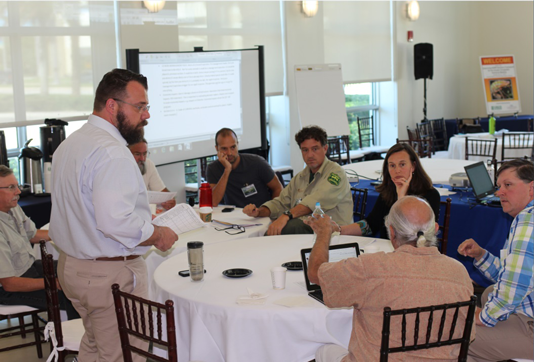 November 2, 2015 - On October 20 & 21 at the FAU Boca Campus Alumni Center, the U.S. Geological Survey (USGS) and the Florida Center for Environmental Studies (CES) hosted a technical meeting to address issues relating to invasive species in the Florida Everglades. About 50 researchers and managers participated in a series of presentations and working sessions.
November 2, 2015 - On October 20 & 21 at the FAU Boca Campus Alumni Center, the U.S. Geological Survey (USGS) and the Florida Center for Environmental Studies (CES) hosted a technical meeting to address issues relating to invasive species in the Florida Everglades. About 50 researchers and managers participated in a series of presentations and working sessions. On Day One Shannon Estenoz, Director of Everglades Restoration Initiatives at the U.S. Department of the Interior, challenged the group to examine the framework used in the State of Florida—the Early Detection Rapid Response (EDRR) decision framework for nonindigenous species--and improve it for use as a screening tool. Experts from Florida Fish & Wildlife, USGS, the Universities of Florida and Georgia, and the National Park Service presented the tools they currently use in their work. Florida plant and wildlife managers also learned from the procedures and methods presented by authorities from the States of Hawai’i and Vermont. On the second day, three working groups evaluated the EDRR frameworks and provided recommendations and feedback. As a next step, the feedback will be compiled and work will begin on the development of a screening tool. Updates will be posted on the meeting’s website: www.ces.fau.edu/usgs/edrr-technical-meeting/index.php
 November 2, 2015 - The Florida Natural Resources Leadership Institute (NRLI) is now accepting applications for Class XVI (2016-2017). NRLI is an eight-month professional development program that seeks to impact decision making in Florida by creating a network of professionals with members in every county and across all natural resource sectors who can effectively address natural resource issues through conflict management and collaborative leadership. For more information (including the 2016-2017 schedule and application process), please visit http://nrli.ifas.ufl.edu/NRLI_classXVI.shtml.
November 2, 2015 - The Florida Natural Resources Leadership Institute (NRLI) is now accepting applications for Class XVI (2016-2017). NRLI is an eight-month professional development program that seeks to impact decision making in Florida by creating a network of professionals with members in every county and across all natural resource sectors who can effectively address natural resource issues through conflict management and collaborative leadership. For more information (including the 2016-2017 schedule and application process), please visit http://nrli.ifas.ufl.edu/NRLI_classXVI.shtml.
November 2, 2015 - Ricardo A. Alvarez (Research Affiliate at FAU's Florida Center for Environmental Studies) has developed an online course titled, "Beyond Single Building Toward a Community and Regional Resilience Approach" that is now available online on The American Institute of Architects website: https://aiau.aia.org/courses/beyond-single-building-toward-community-and-regional-resilience-approach
Course Description:
In coastal communities, the impacts of hurricanes and earthquakes are exacerbated by sea-level rise and aging infrastructures. This course looks at community actions designed to visualize future impacts, identify critical weaknesses, and identify mitigation measures. We'll explore solutions for building resilient communities. In reviewing case studies, you'll learn: The pros and cons of hazard mitigation approaches in coastal communities; What qualifies a building or community as "resilient"; and Best practices for critical decision-making on development, retrofits, and relocation by incorporating emerging knowledge into project planning. The end result from the strategies presented? Resilient buildings and better protected coastal communities.
Course Description:
In coastal communities, the impacts of hurricanes and earthquakes are exacerbated by sea-level rise and aging infrastructures. This course looks at community actions designed to visualize future impacts, identify critical weaknesses, and identify mitigation measures. We'll explore solutions for building resilient communities. In reviewing case studies, you'll learn: The pros and cons of hazard mitigation approaches in coastal communities; What qualifies a building or community as "resilient"; and Best practices for critical decision-making on development, retrofits, and relocation by incorporating emerging knowledge into project planning. The end result from the strategies presented? Resilient buildings and better protected coastal communities.
November 2, 2015 - The Pine Integrated Network: Education, Mitigation, and Adaptation project (PINEMAP) (based at UF) recently hosted a virtual meeting with special guest Dr. Andrew Hoffman, author of the insightful book “How Culture Shapes the Climate Change Debate” (available here). After PINEMAP researchers presented a brief overview of PINEMAP's different stakeholder groups, Dr. Hoffman spoke with the PINEMAP team about how to build trust to improve climate science communication. A recording of the meeting is available here. If you are interested in better understanding the barriers to communicating with diverse audiences about controversial science issues, PINEMAP encourages you to check out Hoffman's book and his engaging talk.
October 29, 2015 - From the Tampa Bay Climate Science Advisory Panel:
Coastal communities surrounding Tampa Bay are low-lying, densely-populated and therefore vulnerable to sea-level rise. In response to requests from local governments in the Tampa Bay region, Florida Sea Grant (FSG) and the Tampa Bay Regional Planning Council (TBRPC) are facilitating coordinated efforts to guide sea-level rise adaptation planning in the region. The FSG Agent is facilitating the Climate Science Advisory Panel (CSAP), an ad hoc group of experts, including a representative and affiliates of the Florida Climate Institute, whose goal is to provide scientific counsel to local governments planning for a changing climate. The TBRPC is convening a network of planners, developers, emergency managers and policy makers through the ONE BAY: Resilient Communities Working Group (OBRCWG) (http://www.tbrpc.org/onebay/working_group.shtml) improve the regional capacity of the area to withstand uncertainty and adverse impacts associated with sea level rise and other coastal hazards. Together, these groups are working to promote the pragmatic application of scientific data in public policy.
After a careful review of scientific research and associated literature, the CSAP has drafted a "Recommended Projection of Sea Level Rise in the Tampa Bay Region" (http://www.tbrpc.org/council_members/councilagendas/2015/101215/8c.pdf). The recommendation provides guidance on what sea level rise projections should be incorporated into local planning efforts. On October 9th, the Tampa Bay Regional Planning Council (TBRPC) voted unanimously to accept the Recommendation for distribution to local governments. The TBRPC One Bay Resilient Communities Working Group will continue to facilitate the discussion of adaptation planning with planners, emergency managers and government leaders to identify practical and incremental solutions to address sea level rise. Members of the CSAP are available to present the recommendation of the guidance document to local governments and partners.
For more information about these efforts contact Libby Carnahan, This email address is being protected from spambots. You need JavaScript enabled to view it. or Maya Burke, This email address is being protected from spambots. You need JavaScript enabled to view it..
Coastal communities surrounding Tampa Bay are low-lying, densely-populated and therefore vulnerable to sea-level rise. In response to requests from local governments in the Tampa Bay region, Florida Sea Grant (FSG) and the Tampa Bay Regional Planning Council (TBRPC) are facilitating coordinated efforts to guide sea-level rise adaptation planning in the region. The FSG Agent is facilitating the Climate Science Advisory Panel (CSAP), an ad hoc group of experts, including a representative and affiliates of the Florida Climate Institute, whose goal is to provide scientific counsel to local governments planning for a changing climate. The TBRPC is convening a network of planners, developers, emergency managers and policy makers through the ONE BAY: Resilient Communities Working Group (OBRCWG) (http://www.tbrpc.org/onebay/working_group.shtml) improve the regional capacity of the area to withstand uncertainty and adverse impacts associated with sea level rise and other coastal hazards. Together, these groups are working to promote the pragmatic application of scientific data in public policy.
After a careful review of scientific research and associated literature, the CSAP has drafted a "Recommended Projection of Sea Level Rise in the Tampa Bay Region" (http://www.tbrpc.org/council_members/councilagendas/2015/101215/8c.pdf). The recommendation provides guidance on what sea level rise projections should be incorporated into local planning efforts. On October 9th, the Tampa Bay Regional Planning Council (TBRPC) voted unanimously to accept the Recommendation for distribution to local governments. The TBRPC One Bay Resilient Communities Working Group will continue to facilitate the discussion of adaptation planning with planners, emergency managers and government leaders to identify practical and incremental solutions to address sea level rise. Members of the CSAP are available to present the recommendation of the guidance document to local governments and partners.
For more information about these efforts contact Libby Carnahan, This email address is being protected from spambots. You need JavaScript enabled to view it. or Maya Burke, This email address is being protected from spambots. You need JavaScript enabled to view it..
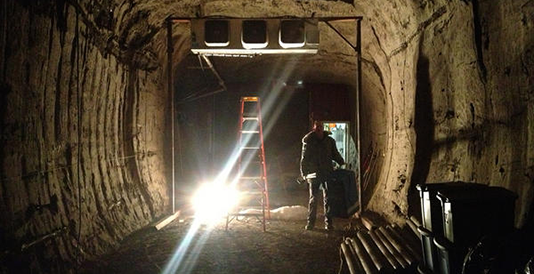 October 27, 2015 - Samples of permafrost soil from deep below the ground in an Alaskan tunnel are providing new clues in the quest to understand what exactly happens as northern regions of the world warm and begin to thaw. FSU doctoral student Travis Drake and Florida State University Assistant Professor in Earth, Ocean and Atmospheric Sciences Robert Spencer write in a new paper that permafrost organic material is so biodegradable that as soon as it thaws, the carbon is almost immediately consumed by single-cell organisms called microbes and then released back into the air as carbon dioxide, feeding the global climate cycle. Their findings are laid out in an article published today by the Proceedings of National Academy of Sciences. This is the first time scientists were able to quantify exactly how fast organic carbon from Alaskan permafrost is converted into carbon dioxide.
October 27, 2015 - Samples of permafrost soil from deep below the ground in an Alaskan tunnel are providing new clues in the quest to understand what exactly happens as northern regions of the world warm and begin to thaw. FSU doctoral student Travis Drake and Florida State University Assistant Professor in Earth, Ocean and Atmospheric Sciences Robert Spencer write in a new paper that permafrost organic material is so biodegradable that as soon as it thaws, the carbon is almost immediately consumed by single-cell organisms called microbes and then released back into the air as carbon dioxide, feeding the global climate cycle. Their findings are laid out in an article published today by the Proceedings of National Academy of Sciences. This is the first time scientists were able to quantify exactly how fast organic carbon from Alaskan permafrost is converted into carbon dioxide. "This study really shows what makes permafrost so biodegradable," said Drake, who completed the work while still an employee at the U.S. Geological Survey and master’s degree student at University of Colorado. "Immediately upon thaw, microbes start using the carbon and then it is sent back into the atmosphere."
FSU News Release
PNAS Journal Article
 October 27, 2015 - The USF Patel College of Global Sustainability is excited to announce the launch of four new 12 credit hour graduate certificates starting Spring 2016. The application deadline is December 4, 2016 for the Spring semester. The certificates will be in Sustainable Tourism; Energy Sustainability; Water Sustainability; and Global Sustainability.
October 27, 2015 - The USF Patel College of Global Sustainability is excited to announce the launch of four new 12 credit hour graduate certificates starting Spring 2016. The application deadline is December 4, 2016 for the Spring semester. The certificates will be in Sustainable Tourism; Energy Sustainability; Water Sustainability; and Global Sustainability.More Information
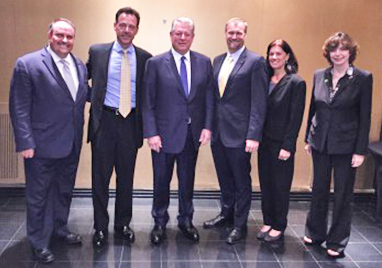 October 16, 2015 - 1,200 climate change leaders, including FIU faculty, staff and students, representing more than 80 countries throughout the world,recently attended the Climate Reality Leadership Corps training with former U.S. Vice President Al Gore. The workshop, hosted by FIU and The Climate Reality Project, offered training in climate science, communications and grassroots organizing to tell the story of climate change and how to inspire communities to take action.
October 16, 2015 - 1,200 climate change leaders, including FIU faculty, staff and students, representing more than 80 countries throughout the world,recently attended the Climate Reality Leadership Corps training with former U.S. Vice President Al Gore. The workshop, hosted by FIU and The Climate Reality Project, offered training in climate science, communications and grassroots organizing to tell the story of climate change and how to inspire communities to take action.FIU News Release
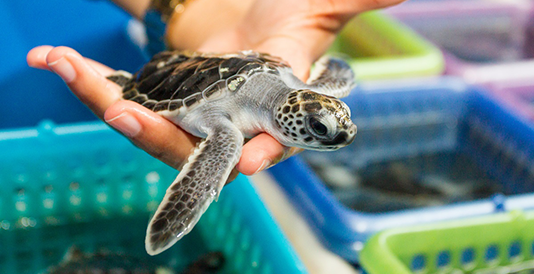 October 15, 2015 - Researchers from Florida Atlantic University have just published the results of a four-year study in the journal Endangered Species Research on the effects of turtle nest temperatures and sand temperatures and on hatchling sex.
October 15, 2015 - Researchers from Florida Atlantic University have just published the results of a four-year study in the journal Endangered Species Research on the effects of turtle nest temperatures and sand temperatures and on hatchling sex. "The shift in our climate is shifting turtles as well, because as the temperature of their nests change so do their reproduction patterns," said Jeanette Wyneken, Ph.D., professor of biological sciences in FAU’s Charles E. Schmidt College of Science. "The nesting beaches along Florida’s coast are important, because they produce the majority of the loggerhead hatchlings entering the northwestern Atlantic Ocean. If climatic changes continue to force the sex ratio bias of loggerheads to even greater extremes, we are going to lose the diversity of sea turtles as well as their overall ability to reproduce effectively. Sex ratios are already strongly female biased...that’s why it’s critical to understand how environmental factors, specifically temperature and rainfall, influence hatchling sex ratios."
FAU News Release
Endangered Species Research Article
FAU News Release
Endangered Species Research Article
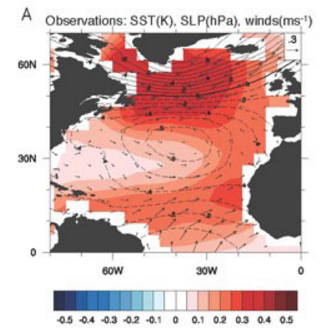 October 15, 2015 - A new study from the University of Miami (UM) Rosenstiel School of Marine and Atmospheric Science (RSMAS) challenges the prevailing wisdom by identifying the atmosphere as the driver of a decades-long climate variation known as the Atlantic Multi-decadal Oscillation (AMO). The findings offer new insight on the causes and predictability of natural climate variations, which are known to cause wide-ranging global weather impacts, including increased rainfall, drought, and greater hurricane frequency in many parts of the Atlantic basin. For decades, research on climate variations in the Atlantic has focused almost exclusively on the role of ocean circulation as the main driver, specifically the Atlantic Meridional Overturning Circulation, which carries warm water north in the upper layers of the ocean and cold water south in lower layers like a large conveyor belt.
October 15, 2015 - A new study from the University of Miami (UM) Rosenstiel School of Marine and Atmospheric Science (RSMAS) challenges the prevailing wisdom by identifying the atmosphere as the driver of a decades-long climate variation known as the Atlantic Multi-decadal Oscillation (AMO). The findings offer new insight on the causes and predictability of natural climate variations, which are known to cause wide-ranging global weather impacts, including increased rainfall, drought, and greater hurricane frequency in many parts of the Atlantic basin. For decades, research on climate variations in the Atlantic has focused almost exclusively on the role of ocean circulation as the main driver, specifically the Atlantic Meridional Overturning Circulation, which carries warm water north in the upper layers of the ocean and cold water south in lower layers like a large conveyor belt. “The idea of the ocean as the driver has been a powerful one.” said UM Rosenstiel School Professor Amy Clement, the lead author on the study. We used computer models in a new way to test this idea, and find that in fact there is a lot that can be explained without the ocean circulation.”
UM RSAMS News Release
Science Article
YouTube Video
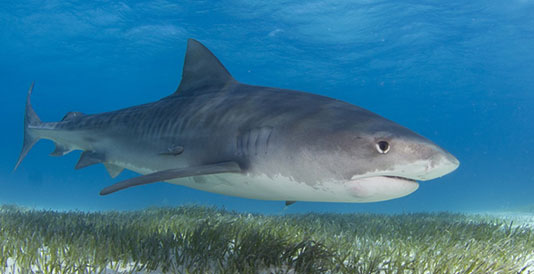 October 12, 2015 - When it comes to mitigating climate change, marine predators could be a key factor. Coastal habitats full of vegetation, including seagrass beds, salt marshes and mangroves, are some of the best absorbers of atmospheric carbon dioxide, according to FIU marine scientists Mike Heithaus and James Fourqurean. Coastal habitats bury carbon 40 times faster than tropical forests. These same habitats are believed to store as much as 25 billion tons of carbon, making them the most carbon-rich ecosystems on the planet. Yet, when the predator population is low, these areas fall victim to overgrazing and sediment disruption. The findings were published this week by Nature Climate Change.
October 12, 2015 - When it comes to mitigating climate change, marine predators could be a key factor. Coastal habitats full of vegetation, including seagrass beds, salt marshes and mangroves, are some of the best absorbers of atmospheric carbon dioxide, according to FIU marine scientists Mike Heithaus and James Fourqurean. Coastal habitats bury carbon 40 times faster than tropical forests. These same habitats are believed to store as much as 25 billion tons of carbon, making them the most carbon-rich ecosystems on the planet. Yet, when the predator population is low, these areas fall victim to overgrazing and sediment disruption. The findings were published this week by Nature Climate Change.FIU News Release
Nature Climate Change Article
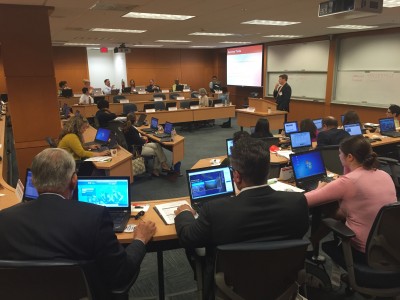 October 5, 2015 - Every dollar spent in actions to reduce disaster losses saves the nation $4 in damages. To build climate change resiliency, the Federal Emergency Management Agency (FEMA) partnered with FIU to provide local community leaders with the knowledge and tools to assess and improve their capabilities to prevent, mitigate, respond to and recover from climate impacts, including sea level rise, drought and wildfires, heatwaves, floods, powerful storms and other hazards. FEMA’s National Exercise Division and FIU’s Sea Level Solutions Center and Southeast Environmental Research Center hosted a seminar Sept. 21-22 that brought together public, private and nonprofit sector decision makers from Miami-Dade and Broward counties. The White House named FIU as the host for the pilot seminar earlier this summer. It will set the stage for building a sustainable, “Climate Adaptation, Preparedness and Resilience Seminar” program across the country.
October 5, 2015 - Every dollar spent in actions to reduce disaster losses saves the nation $4 in damages. To build climate change resiliency, the Federal Emergency Management Agency (FEMA) partnered with FIU to provide local community leaders with the knowledge and tools to assess and improve their capabilities to prevent, mitigate, respond to and recover from climate impacts, including sea level rise, drought and wildfires, heatwaves, floods, powerful storms and other hazards. FEMA’s National Exercise Division and FIU’s Sea Level Solutions Center and Southeast Environmental Research Center hosted a seminar Sept. 21-22 that brought together public, private and nonprofit sector decision makers from Miami-Dade and Broward counties. The White House named FIU as the host for the pilot seminar earlier this summer. It will set the stage for building a sustainable, “Climate Adaptation, Preparedness and Resilience Seminar” program across the country.FIU News Release
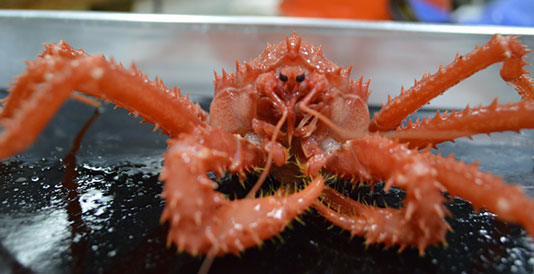 October 2, 2015 - King crabs may soon become high-level predators in Antarctic marine ecosystems where they haven’t played a role in tens of millions of years, according to a new study led by Florida Institute of Technology. “No Barrier to Emergence of Bathyal King Crabs on the Antarctic Shelf,” published online in the Proceedings of the National Academy of Sciences, ties the reappearance of these crabs to global warming. Lead author Richard Aronson, professor and head of Florida Tech’s Department of Biological Sciences, said the rising temperature of the ocean west of the Antarctic Peninsula – one of the most rapidly warming places on the planet – should make it possible for king crab populations to move to the shallow continental shelf from their current deep-sea habitat within the next several decades.
October 2, 2015 - King crabs may soon become high-level predators in Antarctic marine ecosystems where they haven’t played a role in tens of millions of years, according to a new study led by Florida Institute of Technology. “No Barrier to Emergence of Bathyal King Crabs on the Antarctic Shelf,” published online in the Proceedings of the National Academy of Sciences, ties the reappearance of these crabs to global warming. Lead author Richard Aronson, professor and head of Florida Tech’s Department of Biological Sciences, said the rising temperature of the ocean west of the Antarctic Peninsula – one of the most rapidly warming places on the planet – should make it possible for king crab populations to move to the shallow continental shelf from their current deep-sea habitat within the next several decades.FIT News Release
PNAS Journal Article
Photo courtesy of Richard B. Aronson and James B. McClintock.
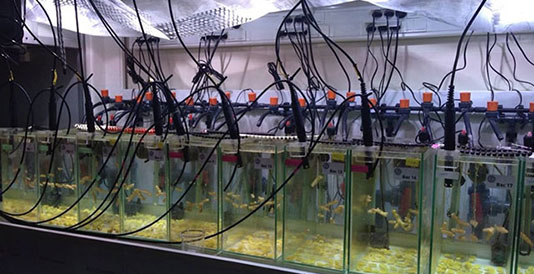 October 2, 2015 - A new study found that a nutrient-rich, balanced diet is beneficial to corals during stressful thermal events. The research led by scientists at the University of Miami (UM) Rosenstiel School of Marine and Atmospheric Science and the Centre Scientifique de Monaco concluded that the particular nutrient balance in seawater is what matters most. "We found that the coral's resilience to thermal stress totally depends on the kind of inorganic enrichment -- if it's 'balanced' or not," said Erica Towle, an alumna of the UM Rosenstiel School.
October 2, 2015 - A new study found that a nutrient-rich, balanced diet is beneficial to corals during stressful thermal events. The research led by scientists at the University of Miami (UM) Rosenstiel School of Marine and Atmospheric Science and the Centre Scientifique de Monaco concluded that the particular nutrient balance in seawater is what matters most. "We found that the coral's resilience to thermal stress totally depends on the kind of inorganic enrichment -- if it's 'balanced' or not," said Erica Towle, an alumna of the UM Rosenstiel School.UM News Release
Limnology and Oceanography Journal Article
Photo credit: Erica Towle, Ph.D.
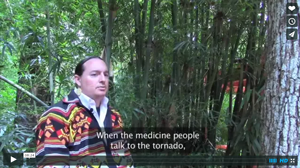 September 30, 2015 - Simone Athayde (UF) and colleagues have released a short video on Indigenous Peoples and Disaster Risk Reduction, co-produced with Maskoke and Seminole representatives in Florida: https://vimeo.com/138904196
September 30, 2015 - Simone Athayde (UF) and colleagues have released a short video on Indigenous Peoples and Disaster Risk Reduction, co-produced with Maskoke and Seminole representatives in Florida: https://vimeo.com/138904196 Dr. Athayde thanks everyone who contributed to this project, as well as the institutions START, TCD/UF, IRDR/Taipeiand ISSC for the support. A corresponding website is also up, and has the link to the video as well as additional information on related work and case-studies (including indigenous peoples and dams in the Amazon): http://www.indigenousknowledgenetwork.org
 September 30, 2015 - The Florida Institute of Technology (FIT) is formally joining the Florida Climate Institute as our 9th member institution! The FIT branch of the FCI will be led by Drs. Robert van Woesik and Mark Bush, both of FIT's Department of Biological Sciences.
September 30, 2015 - The Florida Institute of Technology (FIT) is formally joining the Florida Climate Institute as our 9th member institution! The FIT branch of the FCI will be led by Drs. Robert van Woesik and Mark Bush, both of FIT's Department of Biological Sciences.The Institute for Research on Global Climate Change at Florida Tech will provide the science to forecast the ecological and societal effects of climate change in the State of Florida and beyond. The Institute will focus on unifying and the unique aspect of faculty research that encompasses three distinct ecological assemblages: tropical rain forests, corals reefs, and the Antarctica.
Drs. van Woesik and Bush say they are "looking forward to working with the Florida Climate Institute. The timing of such a collaboration is perfect. Over the next six months, the current 2015-2016 El Nino event may deliver some of the highest tropical and subtropical temperatures on record. We will be evaluating the reef response; corals in the Florida Keys are already bleached white from temperature stress."
September 30, 2015 - Florida Atlantic University (FAU) is receiving new funding to support the following projects:
(1) Support from Florida Sea Grant’s ADaPT: Adaptation Design and Planning Tool for Urban Areas in the Coastal Zone program will allow Jeff Huber’s team of FAU researchers to go “beyond simple stormwater management infrastructure engineering and design to create a unique comprehensive strategy that links isolated research into a meta-disciplinary platform or framework—one which leverages, engineering, ecological and social sciences, and urban design to reward greater resilient planning while enhancing livability.” Award amount: $280,000.
(2) Jeff Huber also secured a National Endowment for the Arts “Our Town” Grant with the City of Fort Lauderdale entitled “Botanizing the Asphalt of North Beach Village: Integrating Public Art and Resilient Design.” The $50,000 grant is currently being developed in the School of Architecture at Florida Atlantic University.
(3) In a collaborative research project with Lehigh University, Diana Mitsova-Boneva at FAU was awarded an NSF Grant for CRISP Type 2/Collaborative Research: Probabilistic Resilience Assessment of Interdependent Systems (PRAISys) in the amount of $296,793. The development, calibration, and validation of PRAISys will enable research on stochastic interdependencies among infrastructure systems in the wake of an extreme event such as an earthquake or severe storm, in which the socio-economic recovery of the affected region depends on the recovery of its infrastructure systems.
(4) Thanks to an NSF grant under the Coastal SEES program, a team of researchers led by PI Colin Polsky will continue work on the question “How will feedbacks between marsh response to SLR and human adaptation responses to potential marsh loss affect the overall sustainability of the combined socio-ecological systems?” An inter-disciplinary program is proposed that leverages the long-term data, experiments and modeling tools at 3 Atlantic Coast Long-Term Ecological Research sites (in MA, VA, GA). FAU has been awarded $148,571 for its portion of work on the project.
(1) Support from Florida Sea Grant’s ADaPT: Adaptation Design and Planning Tool for Urban Areas in the Coastal Zone program will allow Jeff Huber’s team of FAU researchers to go “beyond simple stormwater management infrastructure engineering and design to create a unique comprehensive strategy that links isolated research into a meta-disciplinary platform or framework—one which leverages, engineering, ecological and social sciences, and urban design to reward greater resilient planning while enhancing livability.” Award amount: $280,000.
(2) Jeff Huber also secured a National Endowment for the Arts “Our Town” Grant with the City of Fort Lauderdale entitled “Botanizing the Asphalt of North Beach Village: Integrating Public Art and Resilient Design.” The $50,000 grant is currently being developed in the School of Architecture at Florida Atlantic University.
(3) In a collaborative research project with Lehigh University, Diana Mitsova-Boneva at FAU was awarded an NSF Grant for CRISP Type 2/Collaborative Research: Probabilistic Resilience Assessment of Interdependent Systems (PRAISys) in the amount of $296,793. The development, calibration, and validation of PRAISys will enable research on stochastic interdependencies among infrastructure systems in the wake of an extreme event such as an earthquake or severe storm, in which the socio-economic recovery of the affected region depends on the recovery of its infrastructure systems.
(4) Thanks to an NSF grant under the Coastal SEES program, a team of researchers led by PI Colin Polsky will continue work on the question “How will feedbacks between marsh response to SLR and human adaptation responses to potential marsh loss affect the overall sustainability of the combined socio-ecological systems?” An inter-disciplinary program is proposed that leverages the long-term data, experiments and modeling tools at 3 Atlantic Coast Long-Term Ecological Research sites (in MA, VA, GA). FAU has been awarded $148,571 for its portion of work on the project.
September 30, 2015 - To promote public engagement with the topic of sea-level rise, Florida Atlantic University’s Center for Environmental Studies (CES) invites the South Florida community to document their personal experience with King Tide October 26th-28th. Winning entries will be posted on Facebook and the six best photographers will be invited to participate in a Sea-Level Rise Expedition highlighting challenges and solutions in South Florida in relation to sea-level rise. Winners will be announced November 6th.
For more information visit https://www.facebook.com/SeaLevelRiseSummit
For more information visit https://www.facebook.com/SeaLevelRiseSummit
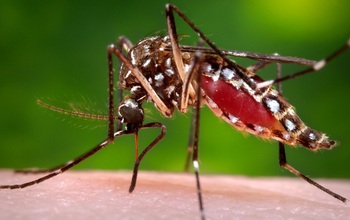 September 30, 2015 - A new 5 year multi-institutional collaborative research grant of $1.85 million funded by the National Science Foundation’s Ecology and Evolution of Infectious Diseases (NSF EEID) program will support research on the effect of temperature on 13 different diseases that use insects for transmission. It will also measure the capacity for two common disease-carrying mosquitoes in the Americas to adapt to new (or changing) temperatures. FCI affiliates Dr. Sadie Ryan (UF), Dr. Leah Johnson (USF), and Dr. Jason Rohr (USF) are three of the investigators on the project.
September 30, 2015 - A new 5 year multi-institutional collaborative research grant of $1.85 million funded by the National Science Foundation’s Ecology and Evolution of Infectious Diseases (NSF EEID) program will support research on the effect of temperature on 13 different diseases that use insects for transmission. It will also measure the capacity for two common disease-carrying mosquitoes in the Americas to adapt to new (or changing) temperatures. FCI affiliates Dr. Sadie Ryan (UF), Dr. Leah Johnson (USF), and Dr. Jason Rohr (USF) are three of the investigators on the project.Many of the world’s most devastating and neglected infectious diseases are spread to people by mosquitoes and other insects. Malaria, a mosquito-transmitted parasite, kills over 650,000 people each year. Dengue fever, an incurable mosquito-borne virus, infects around 400 million people annually, a rate which has grown dramatically in recent decades. With limited options for medical treatment or vaccination, preventing infection is the best way to control these diseases. This approach requires understanding—and predicting—how the climate affects mosquitoes and the diseases they carry.
“If we want to predict the spread of mosquito-transmitted diseases, we have to learn how these insects and pathogens respond to the environment and changing climate,” says Dr. Sadie Ryan, Assistant Professor of Medical Geography at the University of Florida and co-principal investigator on the project. “We will improve on our existing predictive models by validating them with real data. Integrating field data on local conditions with mapped model predictions will enable us to understand the multiscalar dynamics of climate-disease relationships.”












